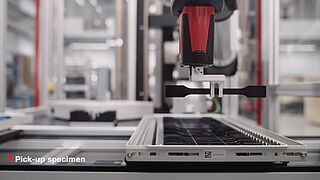Four Capabilities That Drive Increased ROI for Automated Material Testing
Today, automated material and component testing systems are more flexible, economical, and widespread than ever. You can learn more (including some of the biggest misconceptions about automation in materials testing) in our whitepaper here.
In this blog, we take a look at key capabilities that can help automated materials testing solutions drive the greatest possible ROI for QA/QC departments, testing laboratories, and manufacturing facilities. As we explore below, automation can help boost throughput, but that’s only the beginning of the strategic flexibility and operational resilience that automated testing systems can enable.
Benefits of Automated Testing: Throughput and Beyond
Materials and component testing professionals broadly recognize the potential for automated testing solutions to boost throughput. In addition to automation of the testing procedure itself, capabilities such as digitally integrated specimen handling, condition monitoring, and integrated data reporting can help boost throughput by up to 60%. We explore how in our whitepaper on boosting throughput in material testing here.
In our experience, however, the strategic value of automated testing solutions extends beyond direct boosts to throughput. Below, we explore how automated testing helps address some of the biggest strategic challenges for QA/QC professionals today.
Automated Testing Solutions Promote Operational Resilience in the Face of Manufacturing Labor Shortages
The “great resignation” in the wake of COVID created an acute talent shortage for manufacturers, and testing operations are no exception. Based on estimates that 2.1 million manufacturing jobs could go unfilled by 2030, labor shortages are not just a temporary issue. Hiring and retaining talent will be difficult for the foreseeable future, and long-term operational resilience will necessitate reducing dependence on labor. Broadly, manufacturers are expected to transition toward reliance on fewer, more highly skilled employees.
In this context, automation will play a critical role in reducing material testing processes’ dependence on specific technicians with narrow skill sets. In one case, ZwickRoell worked with a steel tensile testing client who illustrated this imperative perfectly. For years, their process depended on a single employee with the strength needed to hold large samples of steel in place as tests were conducted. When he retired, no other technicians on staff were willing or able to perform the same task. In this case, employing an automated solution was critical to not just boosting throughput, but ensuring that operations could continue without the need to staff strong individuals willing to manually handle large pieces of steel!
Automated Testing Systems Promote Flexible Capabilities and Streamlined Scaling
Greater difficulty hiring and retaining talent will also exacerbate the challenges associated with switching over and scaling up different varieties of testing processes. Human technicians must be trained for each new type of test they perform. The need for training can create delays when switching over to a new type of test. Furthermore, difficulty retaining talent will drive challenges for retaining organizational knowledge, even as new hires inflate training costs and create further delays. Testing processes that are heavily reliant on manual labor also create additional barriers to scalability—any need for additional throughput will also require new hires.
Automated testing systems enable the rapid switchover between different testing types. ZwickRoell’s automated testing systems, for example, employ flexible attachments which enable a single machine to accommodate a wide variety of test types. With a variety of industry-standard testing procedures and standards built-in, these solutions reduce the reliance on individual technicians’ knowledge and reduce training requirements for different testing varieties.
Automated solutions also drive superior scalability without the need to make new hires whenever additional throughput is needed. Taken together, the flexibility and scalability of automated testing systems help reduce uncertainty, ensuring the testing process will be ready for whatever the business requires.
Automated Testing Solutions Help Reduce Operator Influence
A challenging labor market also makes it more difficult to ensure quality testing results. In general, it may take at least a year upon hiring a new testing technician to develop their skills and calibrate results to establish a reasonable standard of operator influence. Reducing human impact on testing results is always a valuable benefit of automation, especially so in an environment where retaining the same technicians for long periods will be challenging.
By dramatically reducing operator influence on the testing process, automated testing solutions can effectively function as “robot technicians” who deliver reliable, repeatable results and will never need retraining.
Automation Helps Future Proof Testing Operations
For many materials and component testing operations, predicting future testing needs is extraordinarily difficult. Technology is changing fast, materials are advancing rapidly, and new products can drive the need to scale up new testing processes almost overnight.
Flexible automated testing solutions provide the ultimate answer to uncertainty. For example, ZwickRoell’s solutions can be adapted with different levels of automation over time. A system that is deployed at one scale can be rapidly expanded through, for example, the addition of a fully automated specimen handling system. With the ability to add automated capabilities over time “a la carte,” materials and component testing operations can closely align capital expenditures to current operational needs, avoiding unnecessary expenses while retaining the ability to scale up quickly as needed.
Learn More: Zwick Automation ROI Calculator
Does automation make sense for your business? Find out with our easy-to-use automation ROI calculator.
Or, if you would like to discuss how our automated testing solutions can be tailored to your business requirements, we encourage you to reach out using the form below.
